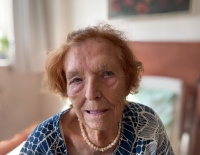Daddy knew I didn’t understand and that I enjoyed turning the crank

Download image
Věra Snížková, née Petráňová, was born on 16 October 1931 in Choltice near Přelouč. Her father, František Petráň, brought tuberculosis from the First World War, which she contracted from him at the age of eight. In 1938, her father was briefly mobilized to Slovakia, and after the Protectorate was declared, he joined the domestic resistance and became part of the Pardubice group of Dr. Josef Bartoň, a collaborator of the Silver A paratroopers. He copied anti-Nazi leaflets on his farm, which little Věra helped him with. When Dr. Bartoň was arrested by the Gestapo in June 1942 and subsequently executed in Zámeček in Pardubice, the Petráň family feared being exposed. But this never happened. After the war, Věra participated as a teenager in the XI. All-Sokol meeting. The communist coup in 1948 meant disaster for a family with a large farm. So that Věra would be allowed to graduate from UMPRUM art school in Prague in 1952, her mother was forced to join a cooperative farm. The witness then worked for two years as a workshop manager in the State Song and Dance Ensemble, and later worked as a clothing designer in the Mira company in Nusle in Prague. In 1957 she married Ivan Snížek, with whom she eventually moved to Havlíčkův Brod. There, her husband worked at the PLEAS Knitting Factory, while after her maternity leave she devoted herself to art therapy and occupational therapy in a psychiatric hospital. The Soviet invasion in August 1968 brought another blow to the family. After Ivan Snížek condemned the entry of troops during the party checks, he was deprived of his post and their children were prevented from attending grammar school. Only the Velvet Revolution brought satisfaction and her husband was appointed director of the whole company. Věra Snížková was living in Prague at the time of recording.

